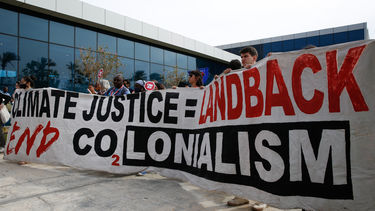Colonialism has been the cause of many environmental challenges since its origin. The impacts of colonialism are present in today's society with the interconnectedness between environmental degradation and colonialism past and present becoming more evident. The dominance of much of the Global North (GN) embedded within the colonial theory which is still seen today helps explain many of the past and present challenges through socio-economic and political dominance alongside environmental exploitation. This has encouraged colonialism to be spoken about recently as a cause and factor in the current climate crisis we are facing. For example, the CARICOM Reparations Commission has linked climate change and colonialism as they advocate for reparations from ‘‘former European powers for their enforced African enslavement and native genocide’’. This instigates the idea that colonialism is an underlying reason for contemporary issues in the climate crisis such as inequalities and exploitation that have been overlooked for years.
The idea of the Anthropocene epoch has expanded in recent years, allowing us to question how colonialism has influenced the development of this human-influenced phenomenon. It is heavily debated when this epoch began, with some suggesting it was identifiable in the 18th century because of colonialism, dominated by Eurocentric, human exploitation (Simpson, 2020). Discussing the origins of the Anthropocene allows us to understand the negative impacts that colonialism has had on our environment, and how it has left us in the position we are in today. This is in contrast to focusing solely on blaming the damaging impacts of modern concepts like capitalism and globalisation. We must address the interconnections between them and colonialism to address ongoing environmental degradation. Colonialism was dominated by exploitation with a heavy focus on economic output for the benefit of the coloniser. Western powers exploited their colonised land and people for natural resources, shaping unequal socio-economic and environmental patterns and making the Global South (GS) more vulnerable, patterns which are still present today.
The legacy of colonialism has challenged our environment due to the structural and societal practices it has left behind exacerbating inequalities. ‘Connecting climate change to such acts of colonisation involves recognising that historic injustices are not consigned to history; their legacies are alive in the present’. Climate injustice is ever-present as the GN has caused significant environmental degradation and exploited the GS. However, not enough blame is placed on the GN to take responsibility for past and present actions, leaving the GS in a vulnerable cycle fuelled by climate emergencies/disasters and poverty-stricken. Therefore, the powerful influence of colonisers remains embedded in society, leaving behind a colonial imprint. However, this imprint is still full of exploitation, past and present, which can be seen through the perspective of climate injustices. Therefore, leaving the developing world with little resilience to protect themselves and manage environmental degradation. This is often exacerbated by further exploitation rather than support from ex-colonisers through reparations.
One of the many environmental challenges that has left much of the GS more vulnerable since colonisers used their dominant power to exploit their land was deforestation. Deforestation caused land to be destroyed affecting millions of habitats, and local livelihoods and making places more susceptible to landslides, flooding and less carbon sequestration. This has made their environments and people more vulnerable and is a process that continues to exacerbate these challenges today. Deforestation often occurred for the benefit of the colonisers, and still today many GN countries use the land and resources for their benefit at the cost of the GS. For example, this was seen in Mexico and many other countries as deforestation levels rapidly increased to supply fuelwood for sugar refineries after Spain colonised Mexico. Mexico also suffered from many other challenges as a result like flooding and mudslides, making their people and environment more vulnerable and susceptible to climate change challenges to this day because of their colonial history.
Understanding environmental degradation through colonialism helps us rethink the challenges when tackling the climate crisis. More attention must be brought to taking responsibility for the direct and indirect global destruction and injustices, primarily in the hands of the GN. Therefore, reparations could play a role in tackling environmental degradation, especially for countries not well-equipped to deal with the challenges. Addressing the reparations agenda has become important to challenge the colonial legacies throughout climate change as more research focuses on colonisation, inequality, and factors like racism within the scope of environmental degradation.
With GN countries being responsible for over 92% of carbon emissions over time something needs to change to move away from the exploitative nature of the colonial era which still exists today. In 2009 ‘wealthy countries’ stated they would contribute $100 billion to developing countries in climate finance by 2020 to 2025, but this has not been achieved in any year. This outlines the continuous power struggle that has been dominant since the colonial era, preventing ex-colonised GS countries from combatting environmental challenges and injustices. Furthermore, many developing countries have been dismissed for raising awareness of the environmental imperialism, injustices, and ecological debt they face as a way to negotiate (Parks and Roberts, 2006). Or is this just being said as a way for the GN to silence them?
To conclude, rethinking the issues of environmental degradation through colonialism has highlighted the structures embedded in society during the colonial era, and how much they resonate in today's polarised world. Therefore, moving forward we must acknowledge colonialism when tackling environmental degradation and its challenges. Addressing GN responsibility and climate reparations is key, despite the difficulty as climate injustices have caused the GS to suffer after centuries of exploitation from powerful colonisers.
Reference List
Parks, B.C. and Roberts, J.T. (2006) ‘Globalization, vulnerability to climate change, and perceived injustice’, Society and Natural Resources, 19(4), pp.337-355. doi: https://doi.org/10.1080/08941920500519255
Simpson, M. (2020) ‘The Anthropocene as colonial discourse’, Environment and Planning D: Society and Space, 38(1), pp.53-71. doi: https://doi.org/10.1177/0263775818764679


